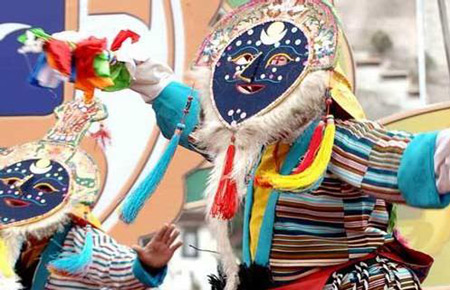There is more ethnic heritage on display in western China. The Shoton (Yogurt) Festival is underway in the Tibet Autonomous Region. The festival celebrates the Tibetan Opera, a local style of theatre in Tibet. For a week, various performances are happening around Lhasa, the capital city of Tibet.

Families have brought buttered tea and barley beer to the parks of the city, immersing themselves in the festive atmosphere.
Artists perform the Tibetan Opera, a local style of theatre in Tibet, photo from china.org.cn.
A performance of a Tibetan play is underway. This play tells of a story of a prince and two madams. It is quite a long show starting at eleven o'clock in the morning and going until five or six o'clock in the late afternoon, which explains why the audience is wise to bring refreshments.
This play represents one of the two major schools of Tibetan plays, "Blue Mask". The other school is called "White Mask".
The Tibetan play was enrolled as a national intangible heritage of China in 2006. But these performers are amateurs.
A performer said, "We make a living as herdsmen. But we practice Tibetan plays during our spare time."
There are eight major productions in the repertoire of Tibetan plays, including one that tells of a Han nationality princess called Wen Cheng who got married to a Tibetan prince more than 1,000 years ago during the Tang dynasty, highlighting the long standing friendship between the Hans and Tibetans.
The eight plays are called the encyclopedia of the life for the Tibetan people.
Among the onlookers are college students who have recorded the unique tradition with their video camera. They aim to let more people know about it.
Tibetan plays will be performed through the whole seven-day Shoton Festival. The tradition is waiting to be recognized as a world intangible heritage, with an application currently on the schedule.
